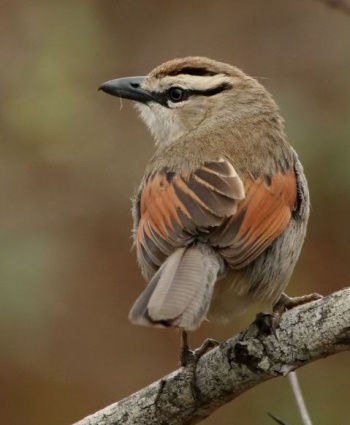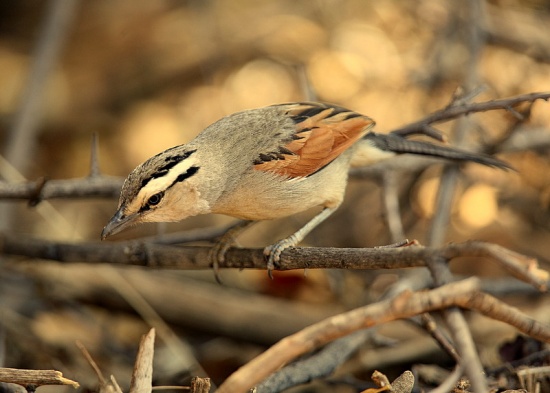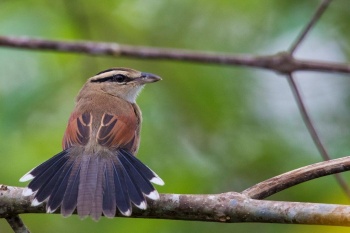- Tchagra australis
Identification
Length 17·5–20 cm (6¾-8 in); mass 29-46 g.
Bill is black in adult, paler in juveniles
Similar species
The Black-crowned Tchagra is larger and has a black crown; the Southern Tchagra is also larger, lacks the thin black stripe above the eyebrow, has a darker brown crown, and lacks the dark stripe on the wing coverts; the female Marsh Tchagra has a black crown and a shorter white eyebrow.

Photo by Alan Manson
iMfolosi Game Reserve, KwaZulu-Natal, South Africa, September 2009
Distribution
Africa south of the Sahara; widespread between about 8°N and about 30°S, although absent from the central Congo Basin and arid zones in the north-east and south-west.
Taxonomy
Subspecies
Nine subspecies have been recognised, based on variation in the colour of the underparts and in size[1]:
- T. a. ussheri: Sierra Leone to south-western Nigeria
- T. a. emini: Southeastern Nigeria to northern and eastern Democratic Republic of the Congo, southern South Sudan, Uganda, Rwanda, Burundi, central Kenya, and northwestern Tanzania
- T. a. minor: South-eastern Kenya, Tanzania, Zambia to northern Zimbabwe and Mozambique
- T. a. rhodesiensis: North-eastern Namibia to north-eastern Botswana, south-eastern Angola, extreme south-western Zambia
- T. a. ansorgei: Western Angola (Luanda to Moçamedes)
- T. a. bocagei: Angola (central Cuando-Cubango)
- T. a. souzae: South-eastern DRC to central Angola plateau and extreme northern Zambia
- T. a. australis: Eastern South Africa, Swaziland, south-eastern Zimbabwe and southern Mozambique
- T. a. damarensis: Namibia to extreme south-western Angola, Botswana and northern and north-central South Africa
Habitat
Thickets within woodlands; forest edges; scrubby vegetation at higher altitudes; also fallow fields and gardens.
Behaviour
Diet
Their diet consists mostly of a variety of insects, such as grasshoppers, crickets, caterpillars and moths.
Breeding
The nest is a shallow, thin-walled cup of stems, roots and fibres, bound with spider web; lined with fine rootlets; usually low down in mixed bush and tall grass, or up to 3 m above ground in fork of bush or tree. Clutch: 2-4 eggs laid September to March in southern Africa. Eggs: White or pinkish white, spotted and blotched with brown and grey concentrated at thick end. Incubation: About 14-16 days by both sexes, mostly by female. Nestling: 14-16 days; fed by both parents; young remain with parents for at least 5 months after leaving nest.
Vocalisation
In flight display rises with loud bursts of quivering wings, just above vegetation, prrr prrr prrr prrr, followed by gliding descent with spread tail and about 15 melodious double whistles dropping in tone but rising in volume, pa-reeu pa-reeu pa-reeu, etc.; sharp chirrp, chirrp alarm and anxiety calls.
References
- Clements, J. F., T. S. Schulenberg, M. J. Iliff, D. Roberson, T. A. Fredericks, B. L. Sullivan, and C. L. Wood. 2017. The eBird/Clements checklist of birds of the world: v2017, with updates to August 2017. Downloaded from http://www.birds.cornell.edu/clementschecklist/download/
- Handbook of the Birds of the World Alive (retrieved November 2016)
Recommended Citation
- BirdForum Opus contributors. (2024) Brown-crowned Tchagra. In: BirdForum, the forum for wild birds and birding. Retrieved 19 April 2024 from https://www.birdforum.net/opus/Brown-crowned_Tchagra





